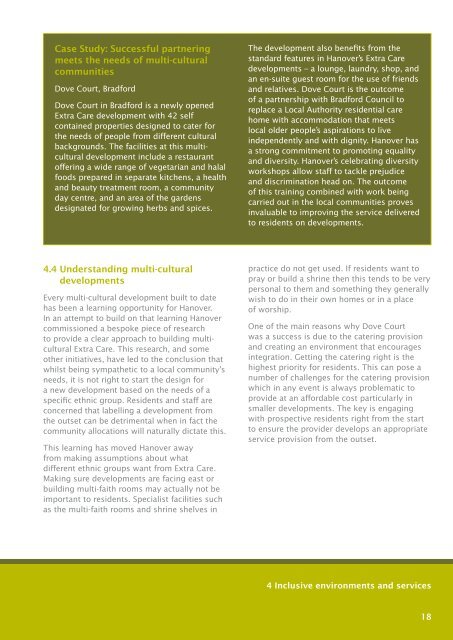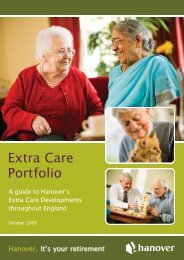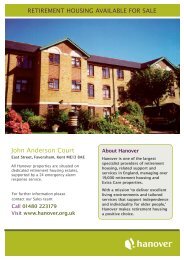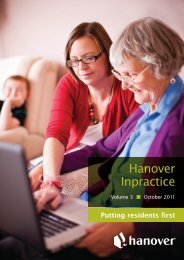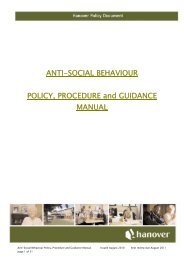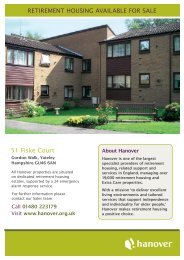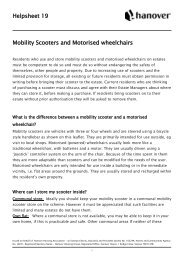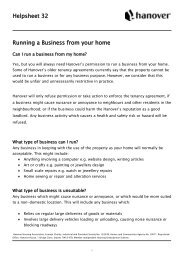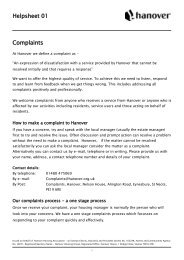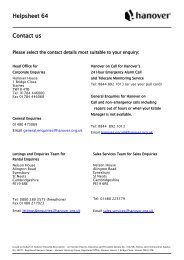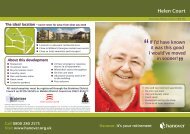20 Years of Extra Care: A Review - Hanover
20 Years of Extra Care: A Review - Hanover
20 Years of Extra Care: A Review - Hanover
Create successful ePaper yourself
Turn your PDF publications into a flip-book with our unique Google optimized e-Paper software.
Case Study: Successful partnering<br />
meets the needs <strong>of</strong> multi-cultural<br />
communities<br />
Dove Court, Bradford<br />
Dove Court in Bradford is a newly opened<br />
<strong>Extra</strong> <strong>Care</strong> development with 42 self<br />
contained properties designed to cater for<br />
the needs <strong>of</strong> people from different cultural<br />
backgrounds. The facilities at this multicultural<br />
development include a restaurant<br />
<strong>of</strong>fering a wide range <strong>of</strong> vegetarian and halal<br />
foods prepared in separate kitchens, a health<br />
and beauty treatment room, a community<br />
day centre, and an area <strong>of</strong> the gardens<br />
designated for growing herbs and spices.<br />
The development also benefits from the<br />
standard features in <strong>Hanover</strong>’s <strong>Extra</strong> <strong>Care</strong><br />
developments – a lounge, laundry, shop, and<br />
an en-suite guest room for the use <strong>of</strong> friends<br />
and relatives. Dove Court is the outcome<br />
<strong>of</strong> a partnership with Bradford Council to<br />
replace a Local Authority residential care<br />
home with accommodation that meets<br />
local older people’s aspirations to live<br />
independently and with dignity. <strong>Hanover</strong> has<br />
a strong commitment to promoting equality<br />
and diversity. <strong>Hanover</strong>’s celebrating diversity<br />
workshops allow staff to tackle prejudice<br />
and discrimination head on. The outcome<br />
<strong>of</strong> this training combined with work being<br />
carried out in the local communities proves<br />
invaluable to improving the service delivered<br />
to residents on developments.<br />
4.4 Understanding multi-cultural<br />
developments<br />
Every multi-cultural development built to date<br />
has been a learning opportunity for <strong>Hanover</strong>.<br />
In an attempt to build on that learning <strong>Hanover</strong><br />
commissioned a bespoke piece <strong>of</strong> research<br />
to provide a clear approach to building multicultural<br />
<strong>Extra</strong> <strong>Care</strong>. This research, and some<br />
other initiatives, have led to the conclusion that<br />
whilst being sympathetic to a local community's<br />
needs, it is not right to start the design for<br />
a new development based on the needs <strong>of</strong> a<br />
specific ethnic group. Residents and staff are<br />
concerned that labelling a development from<br />
the outset can be detrimental when in fact the<br />
community allocations will naturally dictate this.<br />
This learning has moved <strong>Hanover</strong> away<br />
from making assumptions about what<br />
different ethnic groups want from <strong>Extra</strong> <strong>Care</strong>.<br />
Making sure developments are facing east or<br />
building multi-faith rooms may actually not be<br />
important to residents. Specialist facilities such<br />
as the multi-faith rooms and shrine shelves in<br />
practice do not get used. If residents want to<br />
pray or build a shrine then this tends to be very<br />
personal to them and something they generally<br />
wish to do in their own homes or in a place<br />
<strong>of</strong> worship.<br />
One <strong>of</strong> the main reasons why Dove Court<br />
was a success is due to the catering provision<br />
and creating an environment that encourages<br />
integration. Getting the catering right is the<br />
highest priority for residents. This can pose a<br />
number <strong>of</strong> challenges for the catering provision<br />
which in any event is always problematic to<br />
provide at an affordable cost particularly in<br />
smaller developments. The key is engaging<br />
with prospective residents right from the start<br />
to ensure the provider develops an appropriate<br />
service provision from the outset.<br />
4 Inclusive environments and services<br />
18


